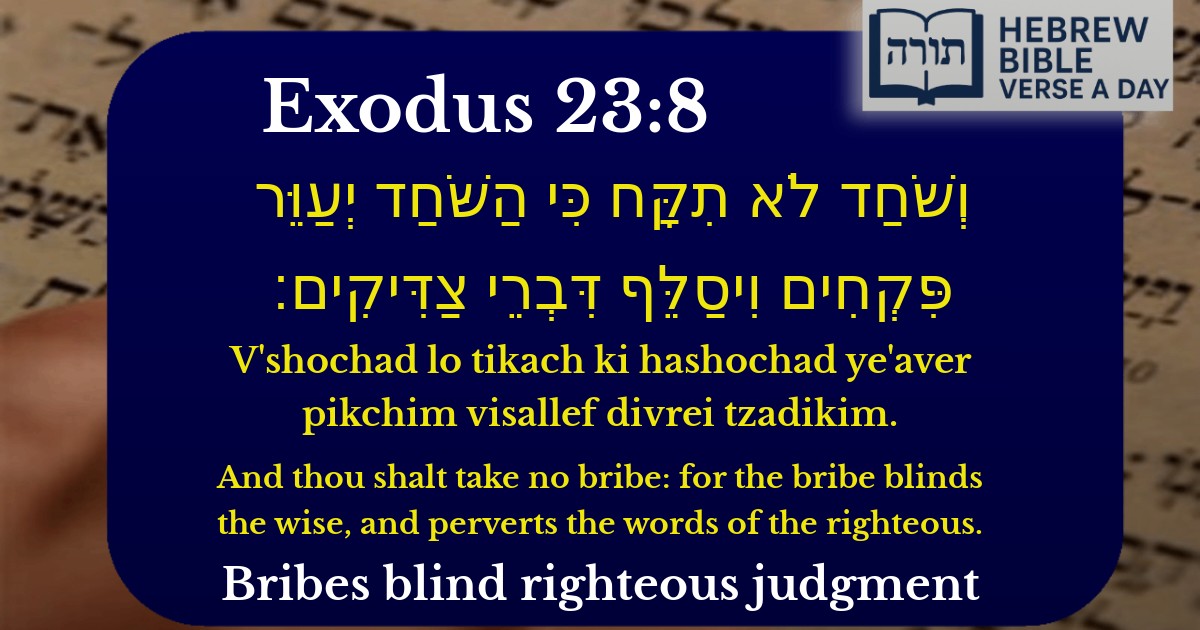Join Our Newsletter To Be Informed When New Videos Are Posted
Join the thousands of fellow Studends who rely on our videos to learn how to read the bible in Hebrew for free!
Hebrew Text
וְשֹׁחַד לֹא תִקָּח כִּי הַשֹּׁחַד יְעַוֵּר פִּקְחִים וִיסַלֵּף דִּבְרֵי צַדִּיקִים׃
English Translation
And thou shalt take no bribe: for the bribe blinds the wise, and perverts the words of the righteous.
Transliteration
V'shochad lo tikach ki hashochad ye'aver pikchim visallef divrei tzadikim.
Hebrew Leining Text
וְשֹׁ֖חַד לֹ֣א תִקָּ֑ח כִּ֤י הַשֹּׁ֙חַד֙ יְעַוֵּ֣ר פִּקְחִ֔ים וִֽיסַלֵּ֖ף דִּבְרֵ֥י צַדִּיקִֽים׃
Parasha Commentary
📚 Talmud Citations
This verse is quoted in the Talmud.
📖 Ketubot 105a
The verse is cited in a discussion about the prohibition of judges accepting bribes and how it affects their judgment.
📖 Sanhedrin 7b
The verse is referenced in the context of discussing the ethical obligations of judges and the severe consequences of accepting bribes.
📖 Pesachim 113b
The verse is mentioned in a broader discussion about ethical behavior and the importance of justice.


Prohibition of Bribery in Jewish Law
The verse (Exodus 23:8) explicitly forbids taking bribes, emphasizing their corrupting influence even on the wise and righteous. Rashi explains that the term "שֹׁחַד" (shochad) comes from the root "שׁ-ח-ד", meaning "to be joined" or "to become one," indicating that a bribe creates an improper bond between the giver and the judge, distorting justice.
The Psychological and Moral Impact of Bribery
Rambam (Hilchot Sanhedrin 23:1) elaborates that a judge who accepts a bribe—even if intending to rule justly—is violating a Torah prohibition. The Talmud (Ketubot 105a) states that a bribed judge becomes incapable of seeing the truth clearly, as the verse says: "the bribe blinds the eyes of the wise." The Midrash Tanchuma (Mishpatim 8) compares this to a person who cannot see clearly after looking at the sun.
Expansions in Rabbinic Literature
The Talmud (Sanhedrin 7b) extends this prohibition beyond monetary bribes—even accepting favors or flattery can disqualify a judge. The Sefer HaChinuch (Mitzvah 83) explains that the Torah’s warning applies to all forms of bias, as human nature is easily swayed by personal benefit.
Practical Halachic Implications
Shulchan Aruch (Choshen Mishpat 9:1) rules that a judge who has received any benefit from a litigant—even a minor one—must recuse themselves. The Rema adds that this applies even if the judge is certain they can remain impartial, as the Torah’s concern is the inherent danger of bias.